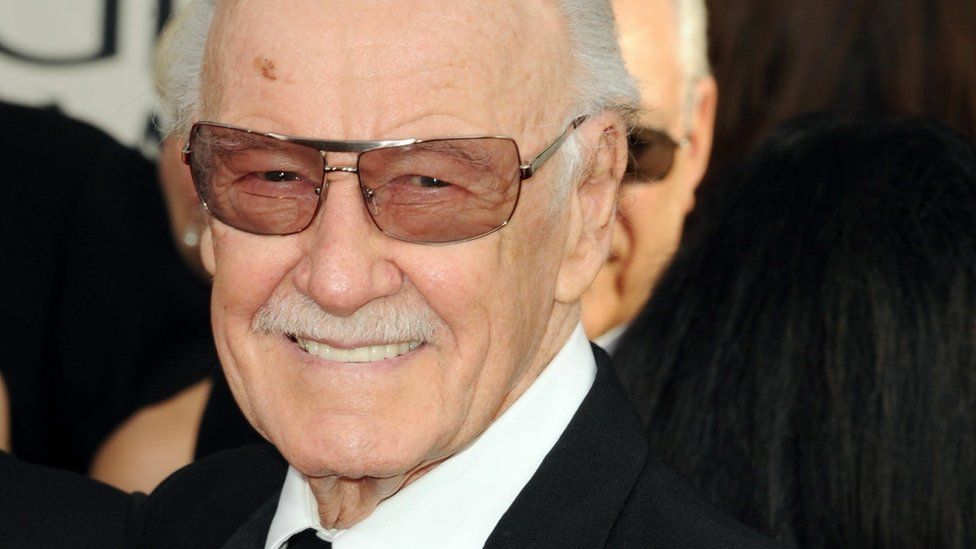Stan Lee obituary: The genius of the superhero creator
- Published

American comic book writer Stan Lee was the human behind the superheroes.
Many marvel at the man who gave his characters extraordinary powers and everyday headaches - a formula which revolutionised comics.
The Hulk, Iron Man, Daredevil and the Fantastic Four all sprang from his fertile imagination and spilled onto the page.
But while his career may have started in pen and ink, it grew and evolved into much more.
From digital graphic novels to blockbuster Hollywood films; leading Marvel Comics from a small division of a publishing house to a large multimedia corporation; Stan Lee was prolific.
Born in 1922 to poor working-class Jewish immigrants from Romania, Stanley Martin Lieber got a job in Timely Publications - that would eventually become Marvel Comics - a company owned by a relative.
He was assigned to the comics division and - thanks to the reach of his imagination - rose to editor by the age of 18.
For more than 20 years, he was "the ultimate hack" - knocking out crime stories, horrors, westerns, anything to sate the appetite of his juvenile readership.
Words of more than two syllables were discouraged. Characters were either all good or all bad, with no shades of grey.
So embarrassed was Lieber by much of what he was writing that he refused to put his real name on the by-line. He assumed the "dumb name", Stan Lee, which he later legally adopted.
By the time he was 40, Lee had decided he was too old for the comic game. His British-born wife, Joan, suggested he had nothing to lose and, for his swansong, should write the kind of characters he really wanted to create.
After a rival comic had come up with a superteam consisting of Batman, Superman and Wonder Woman, Timely needed to respond.
Lee's answer, in 1961, was the Fantastic Four - a team of astronauts who gained super powers after being bombarded with cosmic rays.
They were to change Lee's life, and the comics industry, forever.
Lee gave each character individual, everyday teenage problems such as dandruff and acne. They would frequently fall out with their parents and each other.
The fan letters poured in. Without immediately knowing it, Stan Lee had ushered in the so-called 'silver age' of comics, and his imagination was rekindled. His Marvel universe spawned the new title of Marvel Comics.
Soon after, nerdy Peter Parker was transformed - after a bite from an irradiated spider - into someone who could crawl up the sides of New York's skyscrapers. Spider-Man was born.
He was to become an icon of modern popular culture. Spidey, as he is affectionately known, had quite extraordinary powers - yet he had problems at work, at home and with his girlfriends.
At last, the teenager was no longer just the sidekick, but the main hero. And the hero was no longer just brawn, he had brains too.
"Just because he's a hero and has super powers doesn't mean he doesn't have problems," Stan Lee told the BBC.
The Hulk, The Mighty Thor, Iron Man and the rest all grappled with problems like drug abuse, bigotry and social inequality.
Radically, Lee gave the artists responsible for the comic designs credits for their work. Jack Kirby, Frank Miller, John Romita and and others achieved cult status in their own right.
Other superheroes broke new ground in other ways. Daredevil was blind, Black Panther was black and Silver Surfer pondered the state of humanity. Lee's influence remains. Some years ago the Marvel hero, Northstar, came out of the closet.
In its heyday, Marvel was selling 50 million copies a year. Until he retired from editing in 1971, Stan Lee wrote all the copy for Marvel's covers.
In 1999, his Stan Lee Media venture, aimed at marrying comic-strips with the internet, went spectacularly wrong. Lee went bankrupt and his business partner landed in prison for fraud.
In 2001 though, he started a new company entitled POW! (Purveyors of Wonder) Entertainment, which went on to develop films and TV programmes.
His half-century-year-old creations are still as enduring as ever - with X-Men, Fantastic Four, Hulk, Daredevil, Iron Man and the Avengers all given the Hollywood treatment.
Spider-Man was a huge box office hit, with the 2002 original and its 2004 sequel taking almost $1.6bn (£857m) in ticket sales around the world - before DVD and merchandise sales were counted.
More recently the three Captain America films, starring Chris Evans, took $2.24bn at the worldwide box office. Robert Downey Jr's Iron Man pulled in $2.4bn. Marvel's appeal was unequivocal.
And fans also delighted in seeing Lee's brief cameo appearances in almost every Marvel live-action movie.
Lee also enjoyed success with graphic novels. In 2012 he co-wrote Romeo and Juliet: The War which landed on The New York Times' best-seller list and launched a YouTube channel, Stan Lee's World of Heroes.
He introduced his digital graphic novel Stan Lee's God Woke at the 2016 Comic-Con. The print version won the 2017 Independent Publisher Book Awards' independent voice award.
In later years he lamented his deteriorating eyesight, which meant he could no longer read the comic books where he made his name.
He told the Radio Times in 2016 that he "missed reading 100%".
And he also talked about what he considered to be the greatest superpower - luck.
He said: "Every time I go to a comic book convention, at least one fan will ask me, 'What is the greatest superpower of all?' I always say that luck is the greatest superpower, because if you have good luck then everything goes your way."